Rachel Held Evans's Blog, page 52
January 3, 2013
Help me make the blog better in 2013
Last year was a record-setting year on the blog (7.3 million
pageviews!), but there’s always room to grow and improve. So I’ve set aside this first week of the new
year to brainstorm, schedule, plan, and troubleshoot some new ideas for the
blog in 2013. I wanted to let you know a little of what’s on my mind so you can
weigh in with your own ideas in the comment section. So here’s what I’m
thinking:
Next week I’ll be announcing a new series on sexuality and
the Church that I’m super excited about. Like our Bible series from last year,
this one will extend through most of 2013 with a new post appearing every
Monday. We will work through several books, including Justin Lee’s Torn, Wesley
Hill’s Washed and Waiting, Jack Rogers’ Jesus, The Bible, and Homosexuality,
Amy Frykholm’s See Me Naked, and more. In addition, the series will feature
multiple interviews and guest posts. I’ve selected a group of friends to keep
me accountable and provide some leadership as we work through this series, as I
am keenly aware of my own privilege leading this conversation as a straight
woman. When I ask people what they want to talk about, this is the most common
response. So let’s talk about it!
I loved, loved, loved working on our Week of Mutuality last
year, so I want to introduce more weeklong theology/Bible series in 2013. A few
ideas: “Hell Week” (discuss various positions on heaven, hell, and salvation), “The
Future of Evangelicalism,” “5 Days to a Better Blog” (I rarely discuss
blogging/writing here, but would like to do more of that for my fellow
writers!), “Submission in Context” (maybe I’m the only one fascinated by Peter
and Paul’s remix of the Greco-Roman Household Codes found in the epistles, but every day I am
confronted with the ways in which misunderstandings of those passages have
influenced gender assumptions in the church; worth spending some serious time
reexamining them), “Singles Week” (a series of guest posts from single folks),
“Practical Egalitarianism” (what egalitarian relationships look like in real
life), and "Domestic Violence & The Church." Let me know if you have any other ideas for weeklong series. These would
typically be coupled with a synchroblog through which you can lead your own
discussions. I doubt we will get to all of them, so let me know which ones are of most interest to you.
The “Ask a…” series will continue, though a little less
frequently, with one or two interviews each month. I’d also like to include
more personal interviews, and have already spoken with N.T. Wright about doing
“Ask N.T. Wright…” this spring! If you have ideas for specific individuals you
would like to interview, leave those suggestions in the comment section. And if
you have ideas for regular editions to the “Ask a…” series (“Ask a Buddhist,”
“Ask a Reform Jew,” etc.), let me know, but be as specific as possible by
including a name of someone I might contact for the interview. I’m also looking
for several participants to help us with Hell Week, so if you have suggestions
for “Ask an exclusivist,” “Ask an inclusivist,” “Ask an annhiliationist,” or
“Ask a universalist,” please help me out!
Some other things to look for this year:
I plan to share more personal stories and photos this year,
including stories from “the road,” since I will be travelling like a crazy
person this spring. (Will post the schedule later today or tomorrow). We’ll
also be talking a lot more about CHURCH—which is consistently the most popular
topic on the blog and possibly the topic of my next book. I hope to partner
with World Vision for another fundraiser or two, and I’d like to talk more
about the idea of sacred time, particularly in our fast-paced, chatter-filled
world. I am making an effort this year to make the voices represented here more
diverse, with perspectives coming from other parts of the world, not just the
U.S. Sunday Superlatives will continue.
Our Women of Valor series will continue, at least for a while longer. Look for more amazing guest posts from
some very talented writers and friends. I’d also like to respond to more of
your questions, so leave some in the comment section and they may turn into
posts!
That said, with as much travelling as I’m doing in the
spring, it’s unlikely that I’ll get a post up every single day. While I’m a
stickler for blogging consistently, ultimately it’s more important to me to
share quality posts than to stick to a daily schedule, so expect some
interruptions, particularly in March and April.
So that’s what I’ve scribbled in my big fat idea
notebook. But this is ultimately a
community, so your ideas and input are critical for making all of this work.
What suggestions do you have for the blog in general and for the themes I
mentioned above specifically? What would you like to see more of/less of? What
questions do you have for me? What questions/issues are you working through in
your own journey?
I’ll be paying close attention to the comment section all day today.
Thanks ahead of time for your ideas!



January 2, 2013
Best Christmas Present Ever
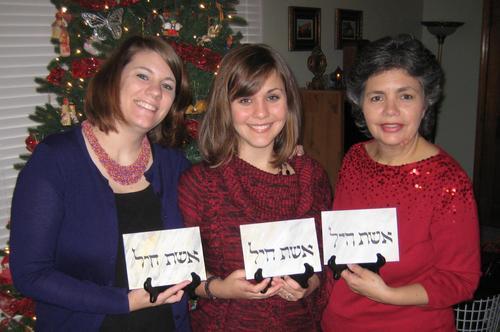
My dad put his Hebrew training and artistic abilities to use
this Christmas by making these beautiful “eshet chayil” plaques for the Held
women of valor. Mine has taken a prize spot in our living room.
Eshet chayil—woman of valor— has long been a blessing of praise in the Jewish community. Husbands often sing the line from Proverbs 31 to their wives at Sabbath meals. Women cheer one another on through accomplishments in homemaking, career, education, parenting, and justice by shouting a hearty “eshet chayil!” after each milestone. Great women of the faith, like Sarah and Ruth and Deborah, are identified as women of valor. One of my goals in writing A Year of Biblical Womanhood was to help evangelicals “take back” Proverbs 31 as a blessing, not a to-do list, by identifying and celebrating women of valor. It's been such a joy to hear from readers who have done just that--contributing to our Women of Valor series, making "valor" their word of the year, honoring their wives and sisters and friends as women of valor, even getting "eshet chayil" tattoos!
I'm so honored and happy that Dad has joined in.
[By the way, A Year of Biblical Womanhood is STILL just $1.99 on Kindle, a pretty great deal for readers on a budget!]



January 1, 2013
Sunday Superlatives – The Best of 2012
Let’s just imagine it’s Sunday...and 2012... shall we?
Best of Twitter:People of the Year:
Malala Yousafzai, a young Pakistani activist who as shot in the head by Taliban on her way home from school.
Balpreet Kaur, who responded to an onslaught of ridicule and hate online in the most gracious and disarming way imaginable, practicing what she preaches about interfaith dialog
Best Books:

1. Still: Notes on a Mid-Faith Crisis by Lauren Winner
2. Torn: Rescuing the Gospel from the Gays-vs-Christians Debate by Justin Lee
3. Flight Behavior by Barbara Kingsolver
4. The Evolution of Adam by Peter Enns
5. The Jewish Annotated New Testament, edited by by Amy-Jill Levine and Marc Z. Brettler
6. A Woman Called: Piecing Together the Ministry Puzzle by Sara Barton
Best Videos:
1. Tired of Bronco Bamma and Mitt Romney
3. Will Ferrell Freaks Out About Kristen and Robert
4. Chimamanda Adichie – The Danger of a Single Story
5. Nadia Bolz-Weber Speaks to Lutheran Youth about the Gospel
6. Existential Cat Doesn’t Want Your Cheeseburgers
7. Joshua Ledet Sings “It’s a Man’s World” (gives me chills every time)
Favorite Bloggers:Richard Beck at Experimental Theology – for consistently making me think
Kristen Howerton at Rage Against the Minivan - for consistently making me laugh
Sarah Bessey – for consistently making me cry (in a good way)
Best New (to me) Blogs:
How to Talk Evangelical - Addie Zierman
Some Bloggers to Watch in 2013:It was an honor to be named one of “Christianity Today’s 50 Women To Watch,” this year, even though getting watched feels a bit creepy. Here are a few women from whom I expect we will be hearing more in 2013 (in no particular order):
Glennon Melton – You probably know her from her wildly popular blog, Momastery, but Glennon has a book coming out in 2013—Carry On, Warrior—that I’ve had the privilege to read early and that I know you are going to just love. Expect this book to make news!
Nadia Bolz-Weber – I’ve long admired Nadia, the say-it-like-it-is, heavily tattooed founding pastor of House for All Sinners and Saints, who blogs at Sarcastic Lutheran and speaks all over the country, and I am thrilled that she is working with Jericho Books to release two new books in the coming years that I expect will make a serious impact. If you haven’t already, you MUST check out Nadia’s rousing speech to Lutheran youth in New Orleans. (I’ve watched it about seven times now.)
Enuma Okoro – Recently named one of seven top young influencers for the next generation by Catalyst, Enuma is speaking all over the world now, and in June of 2012 was honored as the first woman of African descent to preach at the historic American Church in Paris. Expect to see her at more conferences and events in 2013.
Sarah Bessey – How this lady has managed to write a book while consistently posting amazing essays on her blog is simply beyond me. I think 2013 is going to be a good year for this kindred spirit and friend.
Elizabeth Esther – Elizabeth is the definition of a woman of valor who also has a book releasing in the next year. And she’s planning to blog every day in 2013, which is good news for the Internet!
Nicole Cottrell – Nicole and I don’t always agree, but this woman knows how to blog. If she keeps doing what she’s doing, we can expect her to be a major player in the online conversations that get everyone talking.
Micha Boyett – One of my favorite writers, Micha will be announcing some exciting news shortly. Expect to hear more from her in the coming years.
Jamie Wright – You know her as Jamie, The Very Worst Missionary. I think of her as Jamie, The Very Funniest Blogger. Jamie’s just got a knack for writing in a funny, relatable, and disarming way that manages to entertain while instructing.
Some others to watch: Addie Zierman, Krista Dalton, Grace Biskie, D.L. Mayfield, Kristin Tennant, Dianna Anderson, Jen Hatmaker, Kimberly Knight, Joy Bennett, Emily Maynard, Kathy Escobar, Kelley Nikondeha, and Alise Wright
Around the Blogosphere...Most Relatable:
The Oatmeal with “Making Things”
Most Heartbreaking:
Black Snob with “No Apologies: On the Killing of Trayvon Martin and Being ‘Good’”
Most Challenging:
Kristen Howerton with “Where is the Mommy War for the Motherless Child?”
Most Eye-Opening:
Maria Burnham with “Coming Out to My Bible Study”
Most Inspiring:
Beth Woolsey with “Where else would you build your nest?”
Most Unintentionally Hilarious:
Movie Guide Reviews “Blue Like Jazz”
Best Photo Series:
James Mollison with “Where Children Sleep”
Best Writing:
Sarah Bessey with “In Which I Commission You” and “In Which Love Looks Like Real Marriage” and “In Defense of the Cafeteria”
Best Analysis:
Roy Ciampa with “Identity Mapping”
Best Point:
Alise Wright with “Why the Church Needs to Stop Reaching Out”
Best Response:
Lisa Belkin at Huffington Post with “No, I’m Not Mom Enough”
Best Call to Action:
Idelette McVicker with “Let Us Be Women Who Love”
Best Sentence:
Ben Witherington in “John Piper on Men in Ministry and the Masculinity of Christianity” with, “The problem with the church is not strong women, but weak men who can’t handle strong women.”
Best Advice:
Elizabeth Esther with “What Not to Say to Someone Struggling with Their Faith”
Boldest:
Glennon Melton with “A Mountain I’m Willing to Die On”
Wisest:
Jonathan Martin with “More than a symbol: Why we moved to weekly communion at Renovatus”
Cleverest:
Jana Riess at RNS with “Everything I Need to Know About Hospitality, I Learned from Molly Weasley”
Smartest:
Diana Butler Bass with “A Resurrected Christianity?”
Bravest:
Joy Bennett with "Shame is a Prison, And I'm Breaking Out"
Most Thought-Provoking:
Richard Beck with “Your God is Too Big” and “Orthodox Alexithymia”
Most Helpful:
Dianna Anderson with “The Freedom to Choose”
Most Reasonable:
Skye Jethani with “Why I Defend Muslims”
Best Dayton (TN) Herald headline:
“Dayton Woman Allegedly Assaults Man with Honey Buns”
Best Series:
Ed Cyzewski - Women in Ministry Series
She Loves – Love Letters to Body
Micha Boyett - Practicing Benedict
Dennis Venema at Biologos – Understanding Evolution
So, what makes your best-of-the-year list? What people, blogs, stories, and books did I forget?



December 28, 2012
A (Blogging) Year in Review

From the beginning, blogging has surprised me. I never dreamed it would lead to so many career opportunities, never dreamed it would connect me to such wonderful people, never dreamed it would start so many interesting conversations, never dreamed I would love it as much as I do.
This year brought a string of new surprises. I could never have predicted this time last year that in 2012 folks would find this blog by searching for “vaginagate,” or “woman of valor,” or “feminist Chick-fil-A,” or “Whoopi womanhood,” or “egalitarian pleasuring party.” But that’s what a year of blogging brings—weird, dirty-sounding keyword searches.
Our very first post of 2012 was about loving the Bible for what it is, not what we want it to be. This post set the tone for the year and launched a series on the Bible that started some fantastic conversations in the comment section. We discussed several books related to the Bible, including The Bible Made Impossible by Christian Smith, Scripture and the Authority of God by N.T. Wright, and Inspiration and Incarnation by Peter Enns.
I started speaking more regularly this year, which meant I got to meet more of you in person—at churches, conferences, and colleges from Waco, to Portland, to Minneapolis, to Lynchburg. Some highlights included hanging out with the ladies of Truett Seminary, dancing to “Call Me Maybe” with the youth of the United Methodist Virginia Conference, getting the chance be Nadia Bolz-Weber’s roommate at Wild Goose West, and getting the grand tour of Chicago, complete with pizza, during STORY 2012.
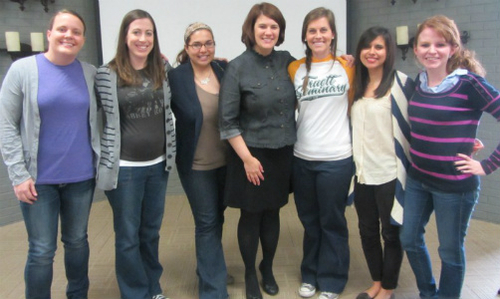
In March, what has affectionately become known as “Vaginagate” happened. So did Kony 2012. Then Anne Rice shared my post on “Rush Limbaugh and Thee Evangelical Blindspots.” It was a good month for blog stats.

Our “Ask a…” series continued, with some amazing contributions from Jonathan Martin (“Ask a Pentecostal”), Helena Burns (“Ask a Nun”), Dianna Anderson (“Ask a Feminist”), Sonny Lemmons (“Ask a Stay-At-Home Dad”), and many more.
In April, I totally pulled your leg with a special edition of Sunday Superlatives.
In May, we spent a week discussing gender, the Bible, and the Church in a weeklong series called “Mutuality 2012.” This turned out to be one of the most rewarding experiences of my blogging career, as I heard from so many readers who were challenged and changed by God’s good news for men and women. Your contributions to the synchroblog started conversations around the blogosphere that I know changed lives.
We talked a lot about church this year. I shared 15 reasons I left church and 15 reasons I’ve returned. Kim VanBrunt shared what it’s like to leave church with a family in tow. I wrote about why I don’t always fit in with mainline churches, and Aric Clark wrote a fantastic response about “the passionate mainline.” We talked about nurturing better conversations between the churched and the un-churched, and then we listened to one another’s church stories—from a young woman with Asperger’s, to an African American calling for reconciliation, to an Episcopal’s love for, and struggle with, the creeds. Look for more of these stories in 2013 as we spend more time exploring denominationalism and church trends and as we “visit” various faith communities around the country.
In June, I explained how to watch an entire season of The Bachelorette and still be too good for it. I also learned that sometimes the shortest posts say the most.
In July, I pissed off some guys at the Gospel Coalition by suggesting that not every woman thinks getting “conquered and colonized” sounds like a good time.
We launched our Women of Valor series in August with an essay contest that brought in some of our finest guest posts ever. Your contributions to this series have been such a joy to read and to share. They truly make the Internet better.
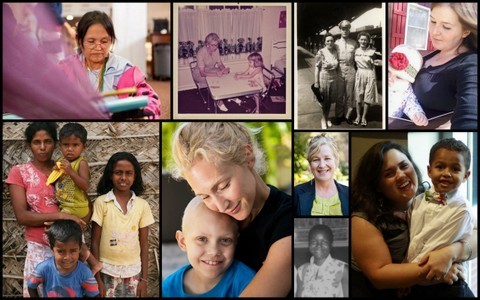
Then, in September, we switched to a new blogging platform (Square Space) and celebrated our 1,000th post. (A big shout-out to Dan for all his work on that.) I started a series on Esther that I never finished (but hope to in the New Year).
In October I explained why I love the Bible and why I don’t think ambition is a sin. Dan hijacked the blog one day.
Things get a little blurry after that. At some point Dan and I flew into New York City during a hurricane, got interviewed on The Today Show and The View, and celebrated the release of A Year of Biblical Womanhood, which you helped catapult to the New York Times Bestseller list for ebooks.

We managed to mostly steer clear of politics this election year, with a few exceptions. On Election Day, we participated in a virtual Election Day Communion.
December was pretty quiet on the blog, with the exception of our most-read post of all time, “God can’t be kept out.”
Another year full of blogging surprises! And I am so, so grateful for each one. Thank you for being a part of my life in this small way. I have learned so much from you, been so profoundly challenged and encouraged by you, and found myself so richly blessed by you, it’s hard to find the right words with which to express my gratitude.
I plan to spend next week plotting for 2013, so if you have any suggestions, please feel free to leave them in the comment section below.
And now, for the obligatory “most popular” list:
Most Popular Posts
2. Some Words for Christians on Both Sides of the Chick-fil-A War
3. How to Win a Culture War and Lose a Generation
4. 15 Reasons I Left Church & 15 Reasons I Returned to Church
5. Enough: Or Why We Should All Be Laughing Hysterically in the Magazine Aisle
6. They Were Right (And Wrong) About the Slippery Slope
7. The Gospel Coalition, Sex, and Subordination
9. Christian Bookstores and Their Chokehold on the Industry
10. “All Right Then, I’ll Go to Hell”
Best Comment Sections
1. Barbara Kingsolver and Church Misfits
2. 90s Christian Music Night at the Roller Rink
3. From Waging War to Washing Feet: How Do We Move Forward?
4. Scattered Thoughts on My Life in the Christian “industry”
Popular Guest Posts (in no particular order)1. “Will you always believe in Jesus, Mama?” (Anonymous)
2. Ask. Seek. Knock. Breath by Beth Woolsey
3. Church Stories: Embracing Faith as an Aspie by Erin Thomas
4. Church Stories: A Plea to Engage in Racial Reconciliation by Grace Biskie
5. Women of the Gospels: The Fab Four by Carolyn Custis James
6. When Men and Women Ministered Together as Equals…In the Early Church by Ed Cyzewski
7. Dear Mother by Sarah Bessey
8. Is God Really Omnipotent? By Tripp Fulller and Bo Sanders
9. Taking My Thumb Off the Scale by Lois Tverberg
10. Just a Mediocre Miracle by Neely Stansell Simpson
So, what were the most popular posts on YOUR blog this year? And what would you like to see more of/less of here in 2013?



December 26, 2012
“A Year of Biblical Womanhood” $1.99 on Kindle
Not sure how long this sale will last, but right now on
Amazon you can get A Year of Biblical Womanhood for your Kindle for just $1.99. You can download it here.
In other fun news, Tony Jones just named A Year of Biblical
Womanhood his Theoblogy Book of the Year.



December 23, 2012
Mary, the Mother of God
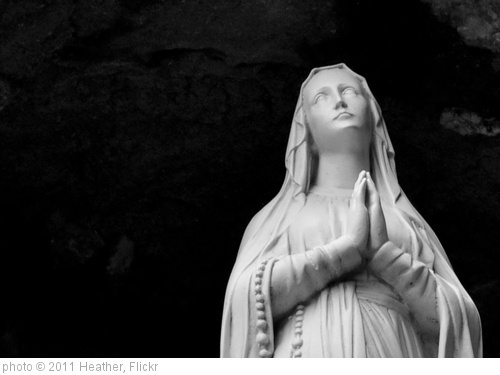
an excerpt from A Year of Biblical Womanhood:
"Mary, she moves behind me
She leaves her fingerprints everywhere
Everytime the snow drifts, every way the sand shifts
Even when the night lifts, she's always there.
Jesus said, Mother I couldn't stay another day longer,
Flies right by and leaves a kiss upon her face
While the angels are singin' his praises in a blaze of glory
Mary stays behind and starts cleaning up the place."
- Patty Griffin, "Mary"
There’s a misconception among some Protestants that Catholic and Orthodox Christians worship the Virgin Mary. The icons, the rosary, the crowning, the Marian hymns—it’s all a bit much, and so they dismiss out of hand any language of veneration that might elevate the mother of Jesus to a place of special esteem and call it idolatry.
It’s a shame, really, because Mary has so much to teach us.
Like Eve, the mother of Jesus has been subjected to countless embellishments of the religious imagination— some of them fair, some of them more reflective of the prejudices and projections of the societies from which they came. Often she appears as a foil to eve: the redemption of womankind and the standard of female virtue. Standing triumphantly atop the temptation scene on Notre Dame Cathedral’s western facade is the statue of the crowned Mary, her royal robes grazing the top of the eve’s head. “What had been laid to waste in ruin by this sex,” Tertullian wrote, “was by the same sex re-established in salvation. Eve had believed the serpent; Mary believed Gabriel. That which the one destroyed by believing, the other, by believing, set straight.”
That a woman who managed to be both a virgin and a mother is often presented as God’s standard for womanhood and can be frustrating for those of us who have to work within the constraints of physical law. Indeed, visions of Mary’s virtue have been amplified though the centuries, far beyond what we find in the biblical text. The apocryphal protoevangelium of James presents Mary as sinless, a perpetual virgin who spent the first three years of her life living in the temple and being fed by angels, and who somehow managed to give birth in a first-century Palestinian barn without feeling an ounce of pain. In 1854 the Catholic Church formally embraced as dogma the Immaculate Conception—the belief that Mary was born without the stain of original sin. It’s as though, over time, Mary’s feet have gotten farther and farther off the ground.
Much could be said in contrast about the “real Mary” of the biblical narrative: the teenage girl from Nazareth who gave birth on a dirty stable floor; the terrified mom who scurried frantically through the streets of Jerusalem, looking for her lost little boy; the woman who had enough influence over Jesus to convince him to liven up a wedding with his first miracle of turning water into wine; the grieved mother who wept in the shadow of the cross. But perhaps the most revealing glimpse into Mary’s true character can be found in the Magnificat—a prayer beloved by saints and Southern Baptists alike.
According to Luke’s gospel, when Mary was betrothed to Joseph, God sent the angel Gabriel to deliver an important message. His presence and his words frightened the young girl.
“Do not be afraid, Mary,” said Gabriel. “You have found favor with God. You will conceive and give birth to a son, and you are to call him Jesus. He will be great and will be called the son of the Most high. The Lord God will give him the throne of his father David, and he will reign over Jacob’s descendants forever; his kingdom will never end.”
“How will this be,” Mary asked the angel, “since I am a virgin?”
Gabriel told Mary that the Holy Spirit would come over her: The “power of the Most high will overshadow you.”
“I am the Lord’s servant,” Mary said resolutely. “May your word to me be fulfilled”
Fully yielded to the will of God, this young, peasant girl offered a bold and subversive prayer that reveals her own hopes for this special child and the future of Israel:
My soul glorifies the Lord
and my spirit rejoices in God my savior,
for he has been mindful of the humble state of his servant.
From now on all generations will call me blessed,
for the Mighty one has done great things for me— holy is his name.
His mercy extends to those who fear him,
from generation to generation.
He has performed mighty deeds with his arm;
He has scattered those who are proud in their inmost thoughts.
He has brought down rulers from their thrones but has lifted up the humble.
He has filled the hungry with good things
but has sent the rich away empty.
He has helped his servant Israel,
remembering to be merciful to Abraham and his descendants forever,
just as He promised our ancestors. (vv. 46–55)
With this prayer, we encounter Mary as Theotokos—the Mother of God, a Greek term that sends many Protestants running for their commentaries, but which beautifully connects the humanity of Mary with her divine call. It comes from the Orthodox Church, and more accurately means “God-bearer” or, “the one who gives birth to God.” Theotokos refers not to Mary as the mother of God from all eternity, but as the mother of God incarnate. She is what made Jesus both fully God and fully man, her womb the place where heaven and earth meld into one.
At the heart of Mary’s worthiness is her obedience, not to a man, not to a culture, not even to a cause or a religion, but to the creative work of a God who lifts up the humble and fills the hungry with good things.
Madeleine L’Engle connects this type of obedience to our own everyday acts of creation. “Obedience is an unpopular word nowadays,” she wrote, “but the artist must be obedient to the work, whether it be a symphony, a painting, or a story for a small child. I believe that each work of art, whether it is a work of great genius, or something very small, comes to the artist and says, ‘Here I am. Enflesh me. Give birth to me.’ And the artist can either say, ‘My soul doth magnify the Lord,’ and willingly become the bearer of the work, or refuses; but the obedient response is not necessarily a conscious one, and not everyone has the humble, courageous obedience of Mary.”
The same applies to faith. One need not be a saint, or a mother, to become a bearer of God. One needs only to obey. The divine resides in all of us, but it is our choice to magnify it or diminish it, to ignore it or to surrender to its lead.
“Mary did not always understand,” wrote L’Engle, “but one does not have to understand to be obedient. Instead of understanding—that intellectual understanding which we are so fond of—there is a feeling of rightness, of knowing, knowing things which you are not yet able to understand.”
Like a good protestant should, I think Mary’s act of radical obedience means more when she is one of us. Imperfect. Afraid. Capable of feeling all the pain and doubt and fear that come with delivering God into the world. But I suspect I may also be a bit of a Catholic, for on the rare occasion that I yield myself fully to the will of God, when I write or speak or do the dishes to magnify the Lord, I start to see Mary everywhere.
**
Read more in A Year of Biblical Womanhood.



December 21, 2012
Sarah Hawthorne Jones – Woman of Valor
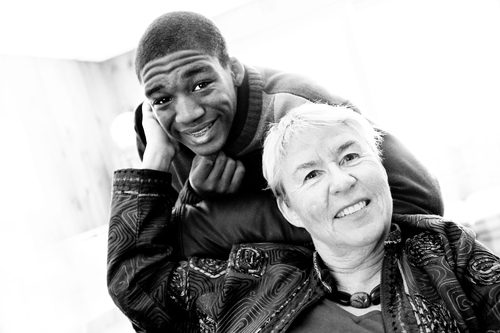
Photo by Courtney Perry
By Tony Jones
In a few months, my mom will turn 70. She’s raised three boys who are now a doctor, a lawyer, and a theologian (one of these things is not like the other!). She spent a decade on the school board in our hometown, and another decade speaking bravely and publicly about her battle with Obsessive-Compulsive Disorder.
But a decade ago, just as she and my dad were looking to cruise into retirement with their friends, her heart was captured by a young man who was sinking into darkness.
Cavonte Johnson was only in elementary school, but he’d already been through hell. He’d been found by authorities, alone, at age 2. His mom was sent to prison for assault, and she’s there still. He doesn’t remember her. He doesn’t know who his dad is.
At some point, his Memphis relatives put him on a bus to Minneapolis to stay with his aunt. At least she had a job. But she was working hard and raising a child of her own—she hadn’t asked for Cavonte to be dropped in her lap, so she left him to his own devices.
My mom knew Cavonte’s aunt and offered to help out on occasion. She’d pick him up and bring him to church and to her house for lunch. She helped him with homework. She paid for him to play in a basketball league. And slowly, the boy opened up to her. He hated staying with his aunt. He returned from school to a cold, dark apartment; and he’d hide under his covers until someone came home.
He was slipping into darkness, as do so many young men who are born into poverty and dysfunction.
At some point, his aunt’s boyfriend threatened him, and Cavonte called my parents to come get him. That was it. The threshold had been crossed. They set up a bedroom for him, transferred him to a new school, and took over guardianship of him.
Over the next four years, my mom tutored Cavonte. He took to math pretty quickly, but he’d simply never learned how to read. So they sat on the couch every night, and he painstakingly read aloud to her, starting with the most elementary books, graduating to The Great Gatsby.
Cavonte played basketball and football and ran track, and my parents went to every game and meet, sitting in the parent section, but the other parents were my age. They went on college visits, two decades after their last son went to college. Cavonte chose the University of Minnesota, where he walked on to the football team—and, more importantly, he’s an engineering major.
The eshet chayil of Proverbs 31 is a valorous woman, it seems, because she is sacrificial: the whole poem is about how she serves her family and the poor. Surely these words have been read and used oppressively, but they need not be seen in that way. There are ways to serve in which the giver does not forsake her identity. Indeed, this is the very example of Christ, reflected in another poem, who humbled himself to the point of death, even death on a cross—and Christ clearly did not relinquish his identity in order to display humility.
Similarly, if you met Sarah Jones, you’d know she’s no shrinking violet. She’s full of opinions and ideas. She’s usually in the middle of three books, planning a party, and thinking about when she can next get up to the family cabin.
But she didn’t become so absorbed in her relatively comfortable suburban life that she couldn’t see someone who needed her to drop everything, delay her plans, and lend a hand.
Merry Christmas, Mom. You are a Woman of Valor to me.
See a video about Sarah and Cavonte here.
***
Tony Jones is an author and blogger.
This post is part of our Women of Valor series. Eshet chayil—woman of valor— has long been a blessing of praise in the Jewish community. Husbands often sing the line from Proverbs 31 to their wives at Sabbath meals. Women cheer one another on through accomplishments in homemaking, career, education, parenting, and justice by shouting a hearty “eshet chayil!” after each milestone. Great women of the faith, like Sarah and Ruth and Deborah, are identified as women of valor. One of my goals after completing my year of biblical womanhood was to “take back” Proverbs 31 as a blessing, not a to-do list, by identifying and celebrating women of valor. To help me in this, you submitted nearly 100 essays to our Women of Valor essay contest. There were so many essays that made me laugh, cry, and think I’ve decided that, in addition to the eight winners we featured in August, I will select several more to feature as guest posts throughout the fall.
We have honored a single mom, a feisty professor, a midwife, a foster parent, an abuse survivor, a brave grandmother, a master seamstress, a young Ugandan woman who reached out to a sister in need, and many more.
Read t he rest of the Women of Valor series here.



December 17, 2012
God can’t be kept out
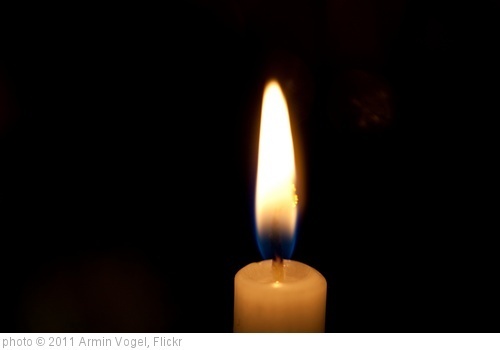
Those little Advent candles sure have a lot of darkness to overcome this year. I see them glowing from church windows and on TV, in homes and at midnight vigils, here in Dayton and in Sandy Hook. Their stubborn flames represent the divine promise that even the smallest light can chase away the shadows lurking in this world, that even in the darkest places, God can’t be kept out.
It’s a hard promise to believe right now, I know. The children in the pictures are just too young, too familiar. Our hearts ache; the darkness seems so heavy and thick.
We all grieve in different ways, and we must be patient with one another as we do, but there is a rumor floating around among the people of God that is so vile, so dangerous and untrue, it simply must be called out. It’s a rumor that began long before the shots rang out at Sandy Hook and long before this Advent season.
It’s the rumor that God can be chased out.
You might have heard it from Bill O’Reilly and those who, every Christmas, work themselves into a frenzy over the “War on Christmas.” They storm checkout counters to demand that clerks issue them a “Merry Christmas” instead of “Happy Holidays,” crying persecution when inflatable manger scenes are moved from public courthouses to private property. They demand that every gift purchased, every mall opened late, every credit card maxed out must be done so in Jesus’ name…or else Christ will be taken out of Christmas. They do it because someone told them that God needs a nod from the Empire to show up, forgetting somehow that God showed up as a Jew in the Roman Empire.
In a barn.
As a minority.
After a genocide.
To the applause of a few poor shepherds.
If the incarnation tells us anything, it’s that God can’t be kept out.
Or you might have heard the rumor from a red-faced preacher who insists that if we can’t keep God’s name in our pledge, on our money, and on our courthouse walls, then we can’t keep God in our country. He has convinced his congregation that the fight of faith is a fight for power, that we win when we see God’s name on our cash, on our statues, on our idols, and in our legislation. He thinks that the removal of God’s name is the removal of God’s very self. He has forgotten that when God showed up, God was executed by the government.
On a cross.
Emptied of all power.
Only to rise from a borrowed grave three days later because God can’t be kept out.
Or, most recently, you might have heard the rumor from Mike Hucakbee or a friend on Facebook, saying that God abandoned the children at Sandy Hook because, though children have every right to pray in public schools, those schools cannot sponsor prayer events out of deference to religious freedom. When asked where God was on that awful Friday morning, these Christians have said that God did not show up at Sandy Hook because “God is not allowed in public schools,” because “ we have systematically removed God” from that place.
Brothers and sisters, let’s call this one for what it is: bullshit.
God can be wherever God wants to be. God needs no formal invitation. We couldn’t “systematically remove” God if we tried.
If the incarnation teaches us anything, it’s that God can be found everywhere: in a cattle trough, on a throne, among the poor, with the sick, on a donkey, in a fishing boat, with the junkie, with the prostitute, with the hypocrite, with the forgotten, in places of power, in places of oppression, in poverty, in wealth, where God’s name is known, where it is unknown, with our friends, with our enemies, in our convictions, in our doubts, in life, in death, at the table, on the cross, and in every kindergarten classroom from Sandy Hook to Shanghai.
God cannot be kept out.
And although my doubt and anger make it hard for me to believe today, I will keep lighting those little Advent candles like a religious fool until they help me in my unbelief. May their flames be a reminder to all of us that we don’t have to know why God let this happen to know that God was there….
and here,
and in those swaddling clothes,
and on that cross,
and in that grave,
and on the throne.
For no amount of darkness can overcome the light.



December 15, 2012
Pearl Odema Tomlinson – A Woman of Valor
by Rev. Cheryl R. Thomas
When her sun freckled hand reached out to pick
up the beautiful bottle with the yellow girl molded to the top, I gasped.
When she put that bottle into the brown paper sack of groceries, I cried
out, “Noo… Aunt Pearl, why would you give them that perfume?”

As
“they” drove into the yard in their beat up rusty old car I never imagined that
the beautiful Avon bottle doll I had coveted might end up going to them.
Five adults and three teenage children were crowded into a brown four door
sedan. I recalled the pictures I had seen of the dust bowl, when I looked at
their dirty clothes and sun darkened skin. It was clear they did not have
combs and had not seen a bath in days or even weeks. The hunger and
thirst in their eyes was evident during the profuse apologies made as they
asked for help. Their heads hung in shame and embarrassment as they
handed us empty gallon jugs for water.
Aunt Pearl’s auburn hair shone bright red in
the sun as she listened intently for a few minutes, then with a determined,
“Let me see what I can do” she turned back to the house where she had raised
six children and seven foster children, calling out directions for the three of
us older visiting Thomas children
to go to various parts of the house for supplies. My brothers were sent
to the root cellar to get Mason jars full of plums, apricots, beans, tomatoes,
pickles, relishes and okra. Every jar a testament to the hours of labor
Aunt Pearl put into canning the vegetables and fruit she grew on her acre and a
half of gardens. I was assigned to filling gallon jugs with water while
Aunt Pearl arranged enough small jars to give the family for drinking. I
saw her reach to the top shelf and pull down her “egg” money jar and put some
coins and dollars in an envelope. I knew the money was from the job she
held as the cook at the state hospital for children. Each cent was
precious but I wasn’t surprised she would give the folks something for
gas.
We were working quickly when she turned to me
and sent me to the bathroom closet to “get some things for them to clean
up.” I had always marveled at the stocks of supplies in Aunt Pearl’s
closets. I reached for a new brush and combs, toothbrushes and bars of
soap. I came into the kitchen with those as she was putting homemade
bread and store bought cereal into the brown paper bags. She looked up
and seemed disappointed with what I had brought out. She said simply, “I
think we can do a little better than that.” She went to the bathroom
closet and came out with deodorants, lotions and bottles of perfume for each
person. I cringed when I saw the bottle shaped like a beautiful girl
amidst the items.
I was still hoping she would realize that I
deserved that bottle and not the dirty, teenage girl with the rats nest in her hair,
when she reached for the bottle. “Why are you giving them that bottle of
perfume?” I blurted out. Aunt Pearl suddenly stopped her constant
motion and looked at me with her bright brown eyes as she realized how much I
wanted that bottle. She smiled kindly at me as she patiently explained,
“The most important thing you can give a person who has had to ask for help is
their dignity. These items are just a way of helping them get their
dignity back. That is something giving them food and water alone can’t
do. This perfume will help them find their way back to dignity and being
proud of themselves. Until they are proud of themselves their lives won’t
change.” She then put the beautiful bottle of perfume into the bag of
groceries.
Forty summers have come and gone since I heard
those words in 1971 when I was eleven. I have spent most of that
time helping people find their own dignity, as a battered women’s advocate, a
congressional aide and then the last twenty five years as an American Baptist
pastor. Every time I heard a request for help I recalled my Aunt Pearl’s
words, “The most important thing you can give a person who has had to ask for
help is their dignity back.” When I read Proverbs 31, I always think of
Pearl Odema Thomas Tomlinson.
She is now 96, living in a nursing home in Oklahoma City and while I have been
unable to see her for three years, I know when I do go that I have to
stay for lunch because it has already been arranged for all her guests to receive
a meal. Being a woman of valor is all she has ever known.
***
Rev. Cheryl R. Thomas is an American Baptist pastor from Des Moines, Iowa.
This post is part of our Women of Valor series. Eshet chayil—woman of valor— has long been a blessing of praise in the Jewish community. Husbands often sing the line from Proverbs 31 to their wives at Sabbath meals. Women cheer one another on through accomplishments in homemaking, career, education, parenting, and justice by shouting a hearty “eshet chayil!” after each milestone. Great women of the faith, like Sarah and Ruth and Deborah, are identified as women of valor. One of my goals after completing my year of biblical womanhood was to “take back” Proverbs 31 as a blessing, not a to-do list, by identifying and celebrating women of valor. To help me in this, you submitted nearly 100 essays to our Women of Valor essay contest. There were so many essays that made me laugh, cry, and think I’ve decided that, in addition to the eight winners we featured in August, I will select several more to feature as guest posts throughout the fall.
We have honored a single mom, a feisty professor, a midwife, a foster parent, an abuse survivor, a brave grandmother, a master seamstress, a young Ugandan woman who reached out to a sister in need, and many more.
Read t he rest of the Women of Valor series here.
,



December 14, 2012
Grieving together
There’s no doubt about it; social media has changed how we
receive and process news. We’re all stunned, heartbroken, angry, and saddened
by the news coming out of Connecticut today, news that at this moment seems too
horrific for me to even name.
With millions of people responding on Facebook, Twitter, and
blogs, I think it’s important to recognize that we all grieve in different
ways. We find ourselves in different stages and manifestations of that
grief—disbelief, anger, stunned silence, the need to do something, the need to
exert some kind of control in a world that seems so desperately out of
control—and so we have to be patient with one another, gracious when our grief
takes different forms.
When someone very close to me died a few years ago, I
remember my dad telling me that it’s important to allow people to grieve in
ways that don’t necessarily make sense to me. It’s important not to correct
people whose grief takes a different form than my own, he said.
So let’s grieve together. And let’s give one another the
space to be shocked, to be pissed, to appeal to God, to be angry with God, to
find peace in God, to question God, to want to take action, to want to wait, to
blame, to pray, to be afraid, to be speechless, to vent, to lament, to speak
up, to be silent, to pull our families close to us, to need some time alone.
Let’s not tell each other how to grieve. Let’s just grieve.



Rachel Held Evans's Blog
- Rachel Held Evans's profile
- 1710 followers



